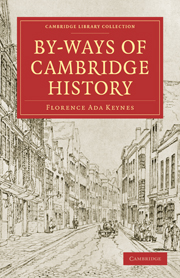Book contents
- Frontmatter
- PREFACE
- Contents
- ILLUSTRATIONS
- Introductory
- Chap. I The Guildhall and the Market Place
- Chap. II The Office of High Steward of the Borough of Cambridge
- Chap. III Cambridge Waits and Orlando Gibbons
- Chap. IV Barnwell Priory and the Old Abbey House
- Chap. V Why Oxford comes First. A Problem in Precedence
- Chap. VI Damaris Cudworth.—A Cambridge Woman of the Seventeenth Century
- Chap. VII A Town Plan for Cambridge in the Eighteenth Century
- Chap. VIII Mendicity House. Sidelights on Social Conditions in Cambridge in the Nineteenth Century
- Appendix: ‘Cambridge’ as a place-name
- Index
- Plate section
Chap. VI - Damaris Cudworth.—A Cambridge Woman of the Seventeenth Century
Published online by Cambridge University Press: 07 September 2010
- Frontmatter
- PREFACE
- Contents
- ILLUSTRATIONS
- Introductory
- Chap. I The Guildhall and the Market Place
- Chap. II The Office of High Steward of the Borough of Cambridge
- Chap. III Cambridge Waits and Orlando Gibbons
- Chap. IV Barnwell Priory and the Old Abbey House
- Chap. V Why Oxford comes First. A Problem in Precedence
- Chap. VI Damaris Cudworth.—A Cambridge Woman of the Seventeenth Century
- Chap. VII A Town Plan for Cambridge in the Eighteenth Century
- Chap. VIII Mendicity House. Sidelights on Social Conditions in Cambridge in the Nineteenth Century
- Appendix: ‘Cambridge’ as a place-name
- Index
- Plate section
Summary
THERE are few Cambridge women of the long past whose names are remembered, and still fewer of whom we possess any detailed knowledge. It may, therefore, be worth while to recall one who was closely associated with the philosopher, John Locke.
Damaris Cudworth was born in 1658. Her father, Master of Christ's, who had already been Master of Clare Hall, was Regius Professor of Hebrew at Cambridge for forty-three eventful years from 1645 to his death in 1688. Leader of the Cambridge Platonists, Cudworth was, like most of his followers, in political sympathy with the Cromwellians. He was an unusually open-minded controversialist, and takes a high place in the roll of learned English divines; Damaris was therefore brought up in a home in which intellectual independence was valued as well as scholarship.
Dr Cudworth did not marry until he became Master of Christ's in 1654, and Damaris and her brothers were born and brought up in the Master's lodgings in the College. It was at that time customary for the Master of Christ's to let all the chambers that he could spare in his official residence to Noblemen, Fellow Commoners, or Gentlemen Pensioners, thus increasing the number of students in the college, and also his own income. The larger rooms were reserved for public occasions and for entertaining distinguished guests. Meanwhile, the Master with his family resided in the Master's private lodgings, or the ‘Old Lodge’, which lay between the College Chapel and Hobson Street. This house, which had been enlarged in 1640, was pulled down in 1748.
- Type
- Chapter
- Information
- By-Ways of Cambridge History , pp. 118 - 126Publisher: Cambridge University PressPrint publication year: 2009First published in: 1947



